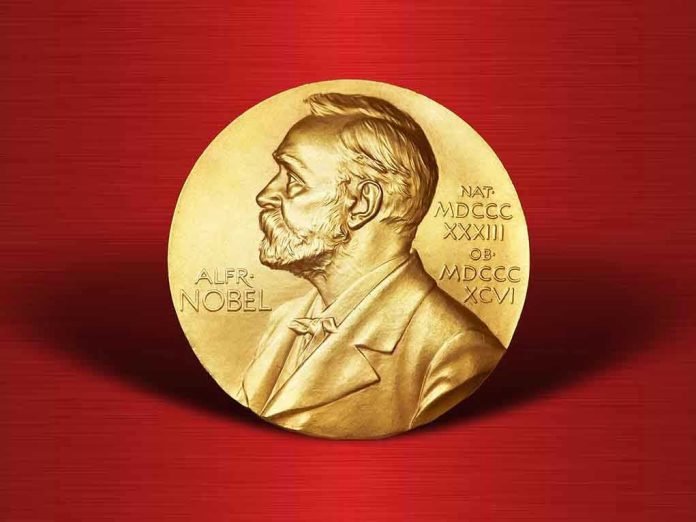
Seven nations across three continents have publicly endorsed President Trump for the 2025 Nobel Peace Prize, igniting fierce debate over his status as a global peacemaker and the true meaning of international recognition.
Story Snapshot
- At least seven nations have formally endorsed or nominated Trump for the 2025 Nobel Peace Prize, citing his direct mediation in multiple international conflicts.
- The White House is leveraging these endorsements as validation of Trump’s foreign policy legacy and a rebuke to previous globalist approaches.
- Expert opinion is sharply divided, with supporters highlighting historic ceasefires and critics questioning the durability of these peace agreements.
- The Nobel Committee will announce the Peace Prize recipient on October 10, 2025, amid record nomination numbers and intense global interest.
Unprecedented Wave of International Endorsements
In a series of public announcements that have surprised international observers, at least seven nations—including Armenia, Azerbaijan, Pakistan, Israel, Democratic Republic of Congo, Cambodia, and Rwanda—have either endorsed or formally nominated President Trump for the 2025 Nobel Peace Prize. These endorsements reference Trump’s successful mediation in longstanding conflicts, such as the India-Pakistan ceasefire in May, the Israel-Iran ceasefire ending the “12 Day War” in June, and the landmark Caucasus peace agreement in August. The White House has celebrated these developments, framing Trump as a uniquely effective peacemaker who delivers where previous administrations, often mired in globalist rhetoric, failed to achieve results.
Governments in volatile regions have pointed to Trump’s intervention as the turning point in halting cycles of violence that have endured for decades. Armenian and Azerbaijani leaders specifically cited his “decisive action” in ending years of hostilities, while Cambodia’s Prime Minister credited Trump’s “extraordinary statesmanship” for resolving a contentious border dispute with Thailand. The U.S. administration, keenly aware of domestic frustration with perceived global weakness and endless conflict under prior leadership, has used these endorsements to reinforce its America First foreign policy and to highlight the stark contrast with the previous administration’s “woke” and ineffectual diplomatic posture.
Debate over Substance and Symbolism of Peace Agreements
While Trump’s supporters celebrate this international recognition as a vindication of his leadership and a victory for conservative values, expert and academic commentary remains divided. Some analysts argue that the peace deals are more about optics than sustainable change, pointing to the fragility of the agreements and questioning whether short-term ceasefires meet the Nobel’s criteria for lasting peace. Others, however, emphasize the tangible cessation of hostilities and the rapid opening of diplomatic channels as evidence of real progress in regions once considered intractable. This division reflects a recurring tension over whether the Nobel Peace Prize should reward visible, high-profile interventions or more gradual, structural efforts at reconciliation.
Public nominations for the Nobel Peace Prize have historically served as political signals, both domestically and internationally. While the Norwegian Nobel Committee maintains strict confidentiality regarding nominees, the White House and endorsing governments have not hesitated to publicize their support for Trump, using the moment to advance their own strategic interests. For many U.S. conservatives, these endorsements are seen as overdue recognition of American leadership and a welcome return to common sense diplomacy after years of leftist policies that, in their view, undermined U.S. influence and emboldened adversaries.
Implications for Trump’s Legacy and the Nobel Peace Prize
If awarded, the Nobel Peace Prize would mark a sharp reversal from the treatment of Trump’s previous nominations and set a new precedent for recognizing direct, results-driven diplomacy. In the short term, Trump’s international profile has soared, and the U.S. has gained diplomatic leverage in key regions. Long-term implications could include a redefinition of what the Nobel Peace Prize represents and a potential boost for future American-led peace efforts. However, the process has also deepened domestic polarization, with critics arguing that political motivations may be overshadowing the Nobel’s original intent. Regardless of the outcome, the endorsement of Trump on the world stage signals a major shift in how U.S. diplomacy is perceived and rewarded.
Seven Nations Endorse Trump for Nobel Peace Prize: 'President of Peace'#News #conservativenews #MAGA #Trump #DOGE #MAHA #PresidentTrump #Texas https://t.co/8eeNpZu9s8
— KeepTexasRed (@TexRed4547) August 14, 2025
The Nobel Committee faces unprecedented scrutiny as it weighs a record 338 nominations for the 2025 prize. Trump’s candidacy is being promoted not only by his administration but also by foreign governments eager to cement closer ties with the United States. For Americans concerned about the erosion of national sovereignty and globalist overreach, these endorsements are a powerful affirmation of a foreign policy rooted in American strength and direct action. The announcement, scheduled for October 10, 2025, will test whether the Nobel Committee acknowledges this new era of diplomacy or clings to the symbolic gestures of the past.
Sources:
Trump nominated for 2025 Nobel Peace Prize for historic Israel-Iran ceasefire
Trump’s Nobel nomination is rewarding optics over peace?
L’Empire, c’est la paix: The Trump campaign for the Nobel Peace Prize



